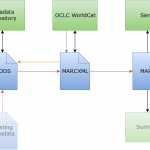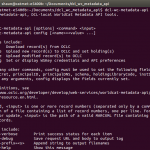The Library uses MODS as its primary descriptive metadata schema for collections and items within the Dartmouth Digital Library Program. Depending on the digital project, new metadata may be created within MODS, or transformed programmatically from existing data sources.

In recent months, we have begun using the WorldCat Metadata API to efficiently contribute batches of new or updated metadata for our digital assets to OCLC's union catalog. Following a metadata transformation from MODS into MARCXML on our end, the API enables us to directly create or update WorldCat master records. The API returns OCLC numbers and other administrative metadata that is stored in our local metadata repository to support iterative record enhancement across both systems.
To incorporate the API into our processes, we developed a new Ruby-based command-line tool, dcl_wc_metadata_api, for which source code and documentation is available on GitHub. Terry Reese's wc_metadata_api and OCLC's oclc-auth-ruby code libraries were critical to this work.

I had the opportunity to share further information about the API and our workflow and tool development at the ALA Midwinter Meeting in January, as part of the ALCTS Technical Services Workflow Efficiency Interest Group program. My slides are available online: "From MODS to OCLC through the WorldCat Metadata API".
I'd be very interested to hear from anyone currently using the WorldCat Metadata API and/or anyone who may have similar use cases for a command-line tool such as this. Additional improvements to dcl_wc_metadata_api are forthcoming, including to leverage recent enhancements to the API itself. To follow its development, stay tuned to future releases on GitHub.